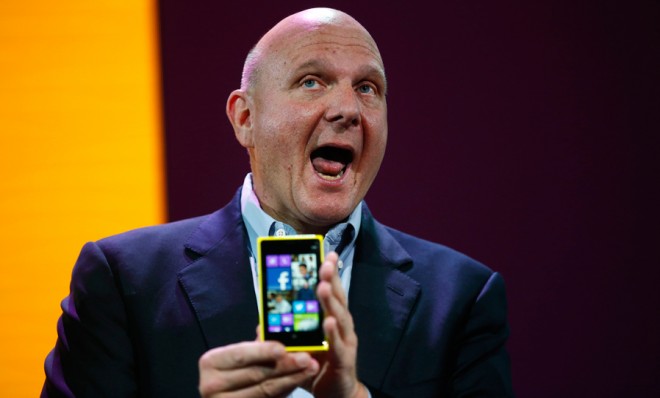Can Steve Ballmer revitalize Microsoft?
The veteran CEO prepares for the PC-pocalypse

A free daily email with the biggest news stories of the day – and the best features from TheWeek.com
You are now subscribed
Your newsletter sign-up was successful
The PC is in danger of going the way of the Gigantopithecus.
Worldwide shipments of PCs fell by 11 percent last quarter, and Intel, the world's largest maker of PC chips, posted its fourth straight quarter of declining sales. As the great migration from desktop to mobile continues to boost Apple and Samsung, Microsoft, the bluest of blue-chip tech companies, is feeling the burn.
Though Microsoft posted $4.97 billion in earnings for the latest quarter, hitting $19.90 billion for the fiscal year, it missed expectations of $20.72 billion, due in large part to an abysmal $900 million writedown for its inventory of unsold Surface RT tablets, which were meant to compete with Apple's iPad. It's just the latest reminder that Microsoft has failed to establish a presence in the consumer tech markets of the future, whether it be tablets or smartphones.
The Week
Escape your echo chamber. Get the facts behind the news, plus analysis from multiple perspectives.

Sign up for The Week's Free Newsletters
From our morning news briefing to a weekly Good News Newsletter, get the best of The Week delivered directly to your inbox.
From our morning news briefing to a weekly Good News Newsletter, get the best of The Week delivered directly to your inbox.
Microsoft's troubles were a driving force behind a plan CEO Steve Ballmer revealed last week to dissolve the company's eight branches, and rearrange them under four new ones with broader themes — a move that is meant to open communication between divisions and result in more rounded products that utilize Microsoft's expertise in hardware, software, and services. The plan, in essence, will restructure Microsoft to more closely resemble its top rivals, Apple and Google.
But will it work?
Abz Sharma and David Grant at The Age say the changes are "long-overdue," and signify "further significant measures" to revamp the business. "Put simply, the message was that Microsoft’s push to become a 'devices and services' company would only succeed if it worked together," they say.
But faith in Ballmer, whom Forbes once described as "the worst CEO of a large publicly traded American company," is far from solid, says The Age.
A free daily email with the biggest news stories of the day – and the best features from TheWeek.com
If Ballmer’s "One Microsoft" reorganization is to live up to its headline as a truly major and meaningful organizational change program, it will almost certainly require greater patience from the company’s stakeholders and well-wishers — including a preparedness, from within and without, that things may well get worse before they get better. [The Age]
In another important initiative, Ballmer has made a big push to move into cloud services — web applications and resources available in the cloud, instead of physical servers, which has long been a bread-and-butter money-maker for Microsoft. "While our fourth-quarter results were impacted by the decline in the PC market, we continue to see strong demand for our enterprise and cloud offerings, resulting in a record unearned revenue balance this quarter," Amy Hood, chief financial officer at Microsoft, said in a statement. "While we have work ahead of us, we are making the focused investments needed to deliver on long-term growth opportunities like cloud services."
For Microsoft, cloud services means Office 365, Windows Azure, and some consumer Web offerings. "The investments they are making in cloud data centers and the services they are rolling out today are very well targeted and extremely competitive," Al Hilwa, application development software analyst at IDC, tells USA Today. Microsoft is on the right track, he says, "but it will take time to translate organizational shift to products and services."
"We have to wait and see how successful they are at blending these services in enterprise agreements for their large customers," says Hilwa.
And despite the painful $900 million loss on the Surface RT, and the fast-shrinking PC market, Microsoft is sitting on an enormous pile of cash.
Given that, Forbes's Agustino Fontevecchia argues that "the effect of the declining PC market may be overstated," and that shareholders ought to be "reassured by Microsoft’s massive and growing war chest, with cash, cash equivalents, and investments hitting $77 billion, second only to mighty Apple."
Still, Microsoft is probably not going to get much love from the stock market until it can prove it can compete with Apple and Google. And it can start by putting out a tablet that people want to buy.
Carmel Lobello is the business editor at TheWeek.com. Previously, she was an editor at DeathandTaxesMag.com.
-
 Local elections 2026: where are they and who is expected to win?
Local elections 2026: where are they and who is expected to win?The Explainer Labour is braced for heavy losses and U-turn on postponing some council elections hasn’t helped the party’s prospects
-
 6 of the world’s most accessible destinations
6 of the world’s most accessible destinationsThe Week Recommends Experience all of Berlin, Singapore and Sydney
-
 How the FCC’s ‘equal time’ rule works
How the FCC’s ‘equal time’ rule worksIn the Spotlight The law is at the heart of the Colbert-CBS conflict